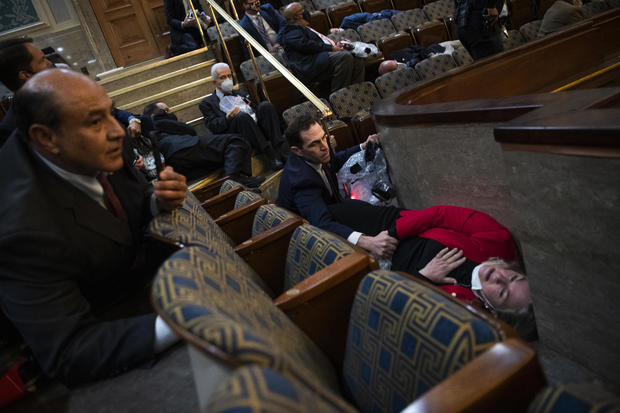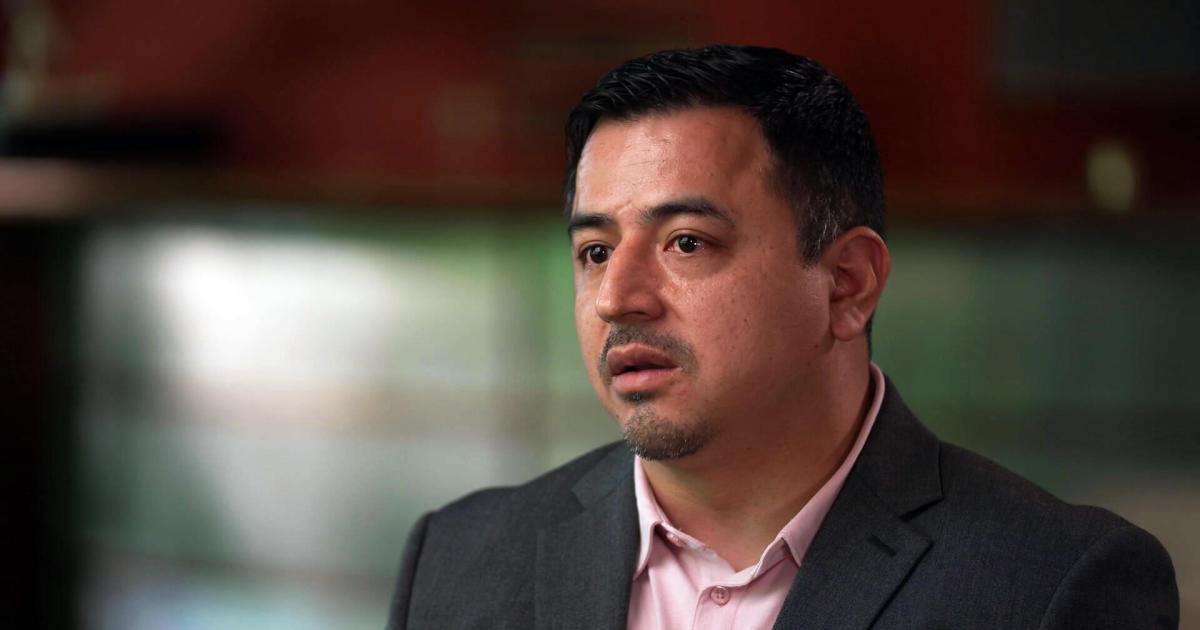Rep. Alexandria Ocasio-Cortez on "trauma" of the Capitol assault, survivor stigma
Democratic Rep. Alexandria Ocasio-Cortez is pushing back against doubts cast on her experience during the January 6 Capitol assault, dismissing them as attempts to "politicize" her account of the day's events.
"It was a big reason why, you know, on top of making sure that we could clear our story due to security concerns, there's also a reason why I sat on my story, as well," she said on "CBS This Morning" Friday. "You know, so many survivors fear being publicly doubted. But the fact of the matter is, is that the account is accurate."
Fellow Democrat Rep. Jason Crow, appearing alongside her, called attempts to cast doubt on their account of the assault "horrific."
"There's no other way to describe it. This re-victimization, this minimization of survivors. This is a big part of the problem, and it has to stop," he said.
In an emotional Instagram live video Monday, Ocasio-Cortez detailed her harrowing experience on January 6, including moments where she thought she would not survive the day.
Crow, whose attempts to comfort a colleague during the riot were captured in an dramatic photograph, was trapped in the House gallery for 20 minutes. He said "the whole situation was chaos."
In the wake of the assault, some Republicans, like Rep. Marjorie Taylor Greene, came under increased scrutiny over pushing conspiracy theories and making controversial comments that many say fueled the tensions that led to the riots. Lawmakers voted to strip Greene of her House committee assignments in a bipartisan vote Tuesday.
Ocasio-Cortez, who has called for Greene to be ousted for her remarks, said she hopes the congresswoman "shows some reflection."
"I will feel safer when she does," she said. "But if she doesn't, it remains a very tense situation"
Read their full conversation below:
"CBS This Morning" co-host Gayle King: Good morning to you both. Congresswoman, I want to start with you, because that day, I remember — it was upsetting and so frightening — just watching from the privacy and safety of my kitchen. So to hear your very terrifying account of that horrible day was, in a word, just terrifying to hear the details. And I wonder if it's triggered all sorts of things for you, because I think sometimes when you speak about it, you're reliving it again. I'm wondering what the experience has been for you?
Rep. Alexandria Ocasio-Cortez: Yeah. You know, I think one of the things that we've learned, especially in counseling services offered to House members, is that telling our stories and re-telling it especially right after the events transpired is a really important part to healing and getting through it. And so once we tell that story — and this applies to survivors of trauma all over the country — telling that story as many times as possible and giving that account, allowing yourself to move through that emotion, allowing yourself to revisit that fear and process it and then move past it is important. But yeah, there are lots of emotions. There's fear, there's anger at folks who attacked our nation's Capitol. There's frustration that this could have happened. But then there's also determination for us to never allow this to happen again.
King: You shared for the first time, Congresswoman, your experience with sexual assault. Why did you decide to share with us? Because it's very painful, certainly, and very private.
Ocasio-Cortez: Yeah. You know, as I was reflecting and telling this story, that backdrop and context is something that I kept, you know, revisiting. And I think for all of us that were there at the Capitol — you know Jason is a combat veteran — we all bring our whole selves, and we all bring our full experiences, and when we encounter such a terrifying moment, we respond with the entirety of our life experience. And so I felt that for transparency to people to understand why I was responding in the way that I did on the sixth, I had to share what I was bringing with me — part of what I was bringing with me that day.
"CBS This Morning" co-host Tony Dokoupil: Congressman Crow, it's Tony Dokoupil here. All of our viewers will remember the photo of you on the day of the insurrection comforting your colleague, Congresswoman Susan Wild. You also stated in an interview with us just the next day that the experience brought back your recollections of combat in Iraq, in Afghanistan — and one could understand that. There's a legacy to trauma. It compounds, as the congresswoman put it, and now a month on I'm curious how are you feeling when you think back to that day, January 6, 30 days on?
Crow: Yeah. I think what's important to understand is that trauma, whether it's combat trauma in my instance or other types of trauma, it is outside the realm of normal human experience. And that everybody is impacted, whether they know it or not. And they're impacted in different ways, on different timelines. And we are not good as a society at dealing with trauma. And why Alexandria and I are here is because one of the biggest problems as a nation, as a society, is the stigma that's put on survivors and that prevents survivors from actually coming forward and getting the help that they need, and it's killing people.
We have over 20 veterans a day that kill themselves because of the stigma that prevents them from getting help, and other survivors deal with that stigma, too. And it has to stop. And that's why what Alexandria has been doing the last couple of weeks is so important, is helping to de-stigmatize that. But you know, I've dealt with it, too, and I never thought in an instant that I would be right back into that type of scenario that I experienced as an Army Ranger in Iraq and Afghanistan, of being fearful for my life or having to fight for my life. But that's what happened on January 6, and we have to deal with it not just as members and as people that experienced it but as a nation, as well.
King: I'm so glad that you're both all right. And you're so right, Jason, when you talk about a stigma. But the other thing I worry about is where is the human connection, where is the empathy here? You have reports today of people doubting your version of events, congresswoman, I want you to comment on that. And number two, you would think that at a time like this we would all bond together, we would all help each other. Have there been anything behind the scenes of Republicans reaching out to say, "Boy, this was scary, I'm so sorry this happened to you, I'm so sorry this happened to us?"
Is there anybody working behind the scenes to try to figure out how we can unite and come together about this?
Ocasio-Cortez: Yes — well, you know, I think it's unfortunately kind of the spring to deny and to politicize our accounts with something that I sat with. And it was a big reason why, you know, on top of making sure that we could clear our story due to security concerns, there's also a reason why I sat on my story, as well. You know, so many survivors fear being publicly doubted. But the fact of the matter is, is that the account is accurate. And you know, when it comes to minimizing the experiences of survivors, that is extremely damaging as well. Because it's not just, you know, folks saying that my story or Jason's story is one thing or the other, but just as Jason said, so many survivors across the country don't get the help that they need because they internalize people saying that, you know, that their trauma isn't big enough to get help.
King: Jason, what do you say about the doubters? And please know, we are not asking either one of you to justify what happened to you today. No one can talk about your trauma. Congressman Crow?
Crow: Yeah. You know, it's just horrific. There's no other way to describe it. This re-victimization, this minimization of survivors. This is a big part of the problem, and it has to stop. I was in the gallery on the House floor, trapped for about 20 minutes, but I was also receiving notifications on my phone that the entire Capitol complex had been overrun, that there was a lockdown of the House office buildings. I had a staff member who was barricading herself into my office in the Longworth House office building because we were all receiving notifications that the rioters were everywhere, that the Capitol police were overwhelmed. So in all of our eyes, the entire situation was chaos. And that was the experience that we were all living through.
King: I want to ask you both, because we're running out of time, about Congresswoman Marjorie Taylor Greene. You know, yesterday the House has voted to strip her of her position on the committee. But I'm wondering if either one of you have concerns and fears going forward about working with her. I know Congresswoman Ocasio-Cortez, you had called for her to be expelled. Are you worried now about working with her? Are you afraid of being around her?
Ocasio-Cortez: Well you know, I think where we draw the line is that this is a place —our nation's Capitol is a place for robust debate, it is where members with completely opposing views can coincide and co-exist. But where the line is drawn is in, you know, issuing physical threats to other members. You know, speaking about physically hurting — and the Speaker of the House, posing with automatic or semiautomatic —
King: We've seen it. That's why I'm asking this question. Are you worried or afraid? And then we've got to go.
Ocasio-Cortez: I would hope that Representative Greene shows some reflection. I will feel safer when she does. But if she doesn't, it remains a very tense situation.
King: All right. Congresswoman Ocasio-Cortez and Congressman Crow, we thank you for your time this morning.




